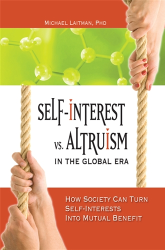
In ancient Mesopotamia, in the face of growing egoism Abraham developed a practical method of balancing this unique human trait. In truth, Abraham’s method was very simple: in the face of heightened egoism, unite and thus discover the quality of bestowal—the Creator. Every element in nature behaves in this way.
- Atoms: The initial levels of desire to receive require very limited organization and form small systems where each element dedicates itself to its host system. We call these elementary systems, “atoms.”
- Molecules: The more evolved levels of desires place atoms within systems we call “molecules.”
- Cells: As the desire evolves further, these systems organize within even bigger systems called “cells.”
- Multicellular Creatures: These group into multicellular creatures, finally leading to the creation of plants, animals, and humans.
In all of this, there is only one principle: the desire to receive in all the elements wishes to receive, and the only way to create balance and sustainability in the system is to unite under a higher-level system. This is what Abraham’s method sought to consciously emulate.
The desire to receive in humans becomes egoism because of our sense of uniqueness. Hence, the antidote to egoism is the exact same cure applied by Nature—the construction of a system to which all parts will contribute and yield their self-interests. In return, the system will guarantee the well-being and sustainability of its elements. Scientists today wish to discover the conditions that existed in the early universe by recreating those conditions on a miniature scale in facilities such as the CERN Hadron Collider in Switzerland. Similarly, by imitating Nature’s “natural” conduct, we will discover its law of bestowal.
Gain the Greatest Delight & Ultimate Goal Out of Life by Not Making the Same Mistake that Was Made in Babel
In truth, the modus operandi is really quite simple: If you think like a giver and act like a giver, we have to at least consider the possibility that you have a small amount of giving in your nature, to paraphrase Douglas Adam’s celebrated quote from Dirk Gently’s Holistic Detective Agency.
However, Nature does not provide us with the instincts to emulate it, as it does with the rest of its elements. Because we are meant to be its rulers, our task is to study these rules by ourselves and subsequently implement them. This is why, when Nimrod expelled Abraham (see the article, “What Is Today’s Significance of the Story of Abraham’s Conflict with Nimrod”), the only man who could teach this rule to the Babylonians, he also denied his people the method of achieving unity—the one antidote to the growing egoism and alienation among his people.
Following Abraham’s departure, Babel continued extolling self-centered abandon. But although pleasure and enjoyment do not contradict the purpose of creation—as we know from Stages Three and One, which received the Creator’s pleasure—receiving pleasure is neither the ultimate goal nor the greatest delight (see the article, “What are the Four Developmental Stages of the Primordial Desire in Creation?”). Man’s greatest delight and ultimate goal are to become like the Creator, and the Babylonians’ negation of that goal is what ultimately ruined them. While Israel was forming into a nation, Babel experienced violent vacillations as the unbridled egoism of its people intensified. Its final disintegration in the 4th century B.C. proved a long, yet unavoidable process.
Yet, Babel was only the first stage in building the highest level in the pyramid of desires—the speaking level. As with all other elements in creation, the final level in the pyramid consists of a root and four stages of evolving desires. Abraham is considered the Root Stage, hence his epithet, Avraham Avinu (Abraham our Patriarch), referring to him being the progenitor of the nation that strived to reach the Creator. Later, he became known as the father of all three Abrahamic faiths, the monotheistic religions of Judaism, Christianity, and Islam.
Discover! The Best Kept Secret Law as Rigid as the Law of Gravity
As desires kept evolving in humanity, a new level of desire in the pyramid emerged atop the Root level, approximately when Egypt was in its prime. This level corresponded to Stage One, and as the Root Stage had its harbinger, Abraham, Stage One had a harbinger of its own, Moses. And just as Abraham was forced by Nimrod to exit Babel, Moses had to flee Pharaoh and exit Egypt, as described in the Pentateuch, “But Moses fled from the face of Pharaoh, and dwelt in the land of Midian” (Exodus 2:15). To understand the importance of Moses’ mission, we need to understand a concept that initially appears to be unrelated—the concept of free choice, as explained by Kabbalah.
As already discussed, the evolution of humanity corresponds to Stage Four in the evolution of desires. In this stage, the desire to receive realizes that behind all that occurs is a thought, a purpose that dictates this series of changes. In our lives, this translates into a child’s drive to not only emulate its parents’ actions, but to wish to know what they know.
To obtain the Creator’s thought, Stage Four needs freedom of thought and freedom of will so it can develop its perceptions independently. Similarly, if you teach a child to think and view the world through a narrow perspective, he will make a very loyal soldier, but probably not a great strategist or general. This, also, is the reason why children—especially in early childhood, before we accustom them to indolence—wish to do things by themselves instead of letting their parents do it for them.
Thus, the need for free choice requires our ignorance of the law by which all creatures achieve balance and sustainability through yielding self-interest to the interest of the host system, so that we can discover it for ourselves. If we knew that this was the law in effect, and that it is as rigid as the law of gravity, we would not dare defy it. And if we had no choice but to follow it, we would, at best, become obedient children, but we would remain children, forever inferior to the desire to give that created that law.
How to Build Creation by Yourself & Become Creator-Like
To equal the Creator, we must learn how to “build” creation by ourselves, every element within it, the reason for its existence, how and when it emerged, and if and when it will expire. To learn that, evolution has created the perfect infrastructure for our learning: it has built a universe in which every element abides by the law of yielding self-interest in favor of the system’s interest. Additionally, evolution denied us the knowledge of this law, and gave us the power to act contrary to it, or not, depending on our choice. And most of all, evolution did not reveal to us the reward for observing this law.
Cells in the body sympathize with the life of their host organism, not their own. If this were not so, they wouldn’t be able to operate in its favor and would become malignant or even prevent the initiation of life altogether. This sympathy is so complete that cells are even willing to terminate their own lives to promote the growth of the entire body in a process known as “apoptosis” or “Programmed Cell Death” (PCD). In embryos, for example, the embryo’s shape of feet is determined by apoptosis, which finalizes the differentiation of fingers and toes when cells between the fingers are deliberately put to death by their host organism.
In return for the cells’ sympathy, they are “rewarded” with the perception of the world of their host organism, instead of their own. That is, cells behave as though they are equipped with an innate perception of the entire organism of which they are parts. If they did not function in this way, they would instinctively try to fight their neighboring cells for supply of nutrients and oxygen, as do unicellular creatures. When such a malfunction occurs in a cell within an organism, this can develop into cancer.
If we, like cells in an organism, could sympathize with our host system—Planet Earth—but even more than that, with the forces that built and sustain the Earth, we would obtain the broadest possible perception and transcend such concepts as time, space, and life and death as we know them. Our perception would reveal that we are part of a much broader system than our immediate surroundings, just as cells are part of the entire organism. In that state, we would be able to think and act as the Creator—the desire to give. And in achieving this, we would achieve the purpose of creation—becoming Creator-like.
Yet, if we could see that by yielding our self-interest we are rewarded with being Creator-like, we would do it in order to receive pleasure, without the aim to give, and without the aim to give we would remain self-centered, disparate from the Creator. To achieve a Creator-like state, we must choose it freely, without being lured in any way toward altruism. Because, as we explained about the four stages, the aim to give is what makes us Creator-like, the desire to receive must not feel that we will receive pleasure or benefit in giving, so it would not create selfish motivation.
When we understand that, we will understand how important the restriction of pleasure by Stage Four is to us. If Stage Four did not repel it, we would succumb to the pleasure just as a baby enjoys its parents’ strength and benevolence toward it, and we would not be able to become like the Creator. Instead, we would be taken by the pleasure, just as moths are lured by the light of a lamp on a dark night.
 “Is it Possible to Give Without any Selfish Motivation?” is based on the book, Self Interest vs. Altruism in the Global Era: How Society Can Turn Self Interests into Mutual Benefit by Dr. Michael Laitman.
“Is it Possible to Give Without any Selfish Motivation?” is based on the book, Self Interest vs. Altruism in the Global Era: How Society Can Turn Self Interests into Mutual Benefit by Dr. Michael Laitman.

you mentioned in the article that the ultimate goal to become like the Creator and the question that presents itself can you man up the limited and non-full to God the unlimited and infinite, which his perfect? If we assume the possibility that how can this be?